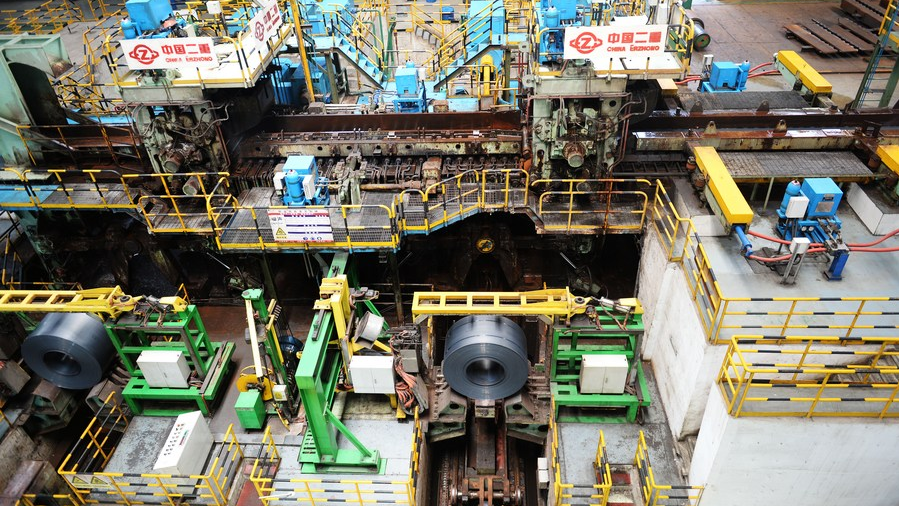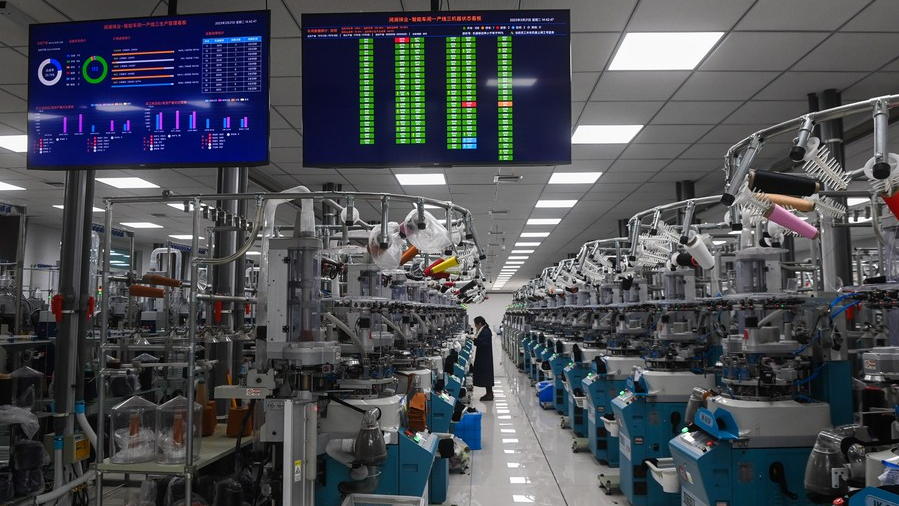
An unmanned production line of a private enterprise in Zhangzhou, southeast China's Fujian Province, June 19, 2023. /Xinhua
An unmanned production line of a private enterprise in Zhangzhou, southeast China's Fujian Province, June 19, 2023. /Xinhua
Editor's note: Djoomart Otorbaev, a special commentator for CGTN, is the former prime minister of the Kyrgyz Republic, a distinguished professor of the Belt and Road School of Beijing Normal University, a member of Nizami Ganjavi International Centre, and the author of the book "Central Asia's Economic Rebirth in the Shadow of the New Great Game"(Routledge, 2023). The article reflects the author's views and not necessarily those of CGTN.
On September 4, it was announced that the Chinese government had created a new department under the National Development and Reform Commission (NDRC) to support its private sector development. This department, known as the private economy development bureau, will be responsible for coordinating reforms and implementing measures to support the development of the private sector. During a press conference on Monday, Cong Liang, deputy head of the NDRC, also announced that Beijing is promoting increased investment in the private sector. To ensure the involvement of private enterprises, local governments have proposed over 3,500 projects, which will necessitate a total investment of 3.7 trillion yuan ($509 billion) .
It is now evident that the new reforms will prioritize companies operating in the field of high technologies. At the same press conference, Xu Xiaolan, the vice minister of industry and information technology, announced that her ministry will soon issue guidelines to promote high-quality development for "little giant" companies. This term refers to small, innovative start-ups that specialize in the latest technologies in a niche market and demonstrate significant growth potential. Vice Minister Xu highlighted the fact that 95 percent of the country's 98,000 "little giant" companies are privately owned. In the first seven months, such companies' return rate was 5.5 percent higher than that of traditional enterprises .
Xu also announced that the ministry of industry and information technology will conduct inspections nationwide to alleviate the burden on businesses and ensure a favorable business environment. Additionally, the ministry will advocate for the repayment of debts owed to small companies to ease their financial stress.
There is a growing concern among analysts that China may not achieve its economic growth target of "about 5 percent" this year. This is due to increasingly gloomy economic data that has recently emerged.
To stabilize the economic situation in the past few months, Beijing has introduced a variety of policies to stimulate consumption, attract foreign investment and promote the private sector. Settling the real estate sector, reducing financial risks, optimizing debt markets and combating deflationary risks were highlighted as priorities.
In July, the government revealed a 31-point plan to assist the private sector to be "bigger, better and stronger." The same month, the NDRC released 17 measures to boost private investment. Along with several other ministries, they developed 28 measures to facilitate tax payments and promote the development of the private sector. These measures focus on improving market access, providing factor support, ensuring legal protection, enhancing corporate services and creating a better business environment.

A woman works at a digital workshop of a hosiery company in Anhua Township of Zhuji, east China's Zhejiang Province, March 21, 2023. /Xinhua
A woman works at a digital workshop of a hosiery company in Anhua Township of Zhuji, east China's Zhejiang Province, March 21, 2023. /Xinhua
It should be emphasized that the private sector plays a very important role in the country's economy. China has over 47 million registered private companies and over 100 million self-employed enterprises. The private sector contributes more than half of China's tax revenue, makes up 60 percent of GDP, drives 70 percent of technological innovation, generates 80 percent of urban employment and comprises 90 percent of market entities.
Despite the government's efforts to spur private sector growth and foster a hospitable climate for entrepreneurs through numerous policies and documents, enforcing these measures remains the major challenge. Thus, a designated bureau was established to bridge the policy formulation and implementation gap.
It is essential to underline that the Chinese economy is not in crisis. Investment in China has accelerated even in the face of a global drop in business activity. During the first half of 2023, France, the UK and Japan increased their investment in China by 173.3 percent, 135.3 percent, and 53 percent, respectively. Around 24,000 new foreign firms were established in China in the same period, marking a 35.7 percent increase from the previous year. Last year, Tesla's Shanghai factory, which produces an electric car every 40 seconds on average, was responsible for half of the company's global shipments. Starbucks has been expanding rapidly in China, operating over 6,500 stores and opening a new one every nine hours.
China's economy is growing rapidly, and its leadership continues pursuing major reforms. These reforms' critical features are the political will, decisive actions and prompt regulatory responses needed to address various challenges. The Chinese political system has the unique characteristic of having diverse political and economic tools at its disposal to respond to new challenges quickly. This ability is crucial in capturing emerging issues and risks before they become systemic. Quick and decisive policy measures are achieving their intended outcomes. The same will be valid for newly developed institutions and policies.
(If you want to contribute and have specific expertise, please contact us at opinions@cgtn.com. Follow @thouse_opinions on Twitter to discover the latest commentaries in the CGTN Opinion Section.)